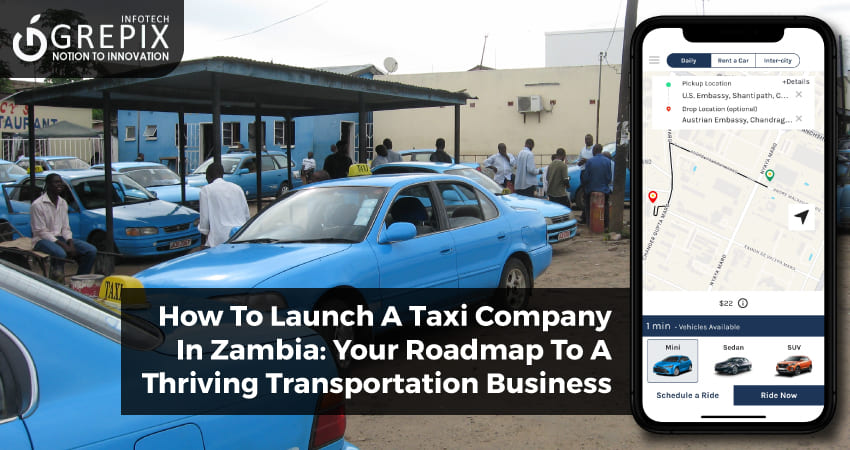How To Launch A Taxi Company In Zambia
Establishing a taxi company in Zambia is a great chance to capitalize on the market's rising need for dependable and effective transportation services. This guide covers everything from initial planning and legal compliance to operations management and providing excellent customer service. It also outlines the strategies, tactics, and considerations for starting a successful taxi business in Zambia.
Launching a taxi company in Zambia offers a golden opportunity in an expanding market hungry for reliable and efficient transportation solutions. This guide encapsulates the entire journey from the initial blueprint and adhering to legal norms to managing operations and excelling in customer service. It delves into strategic planning, understanding the Zambian market's demand for taxi services, and navigating the regulatory landscape. It emphasizes crafting a detailed business plan, selecting an appropriate business model, and ensuring compliance with local laws.
Your Roadmap To A Thriving Transportation Business
1. Market Insights and Regulatory Framework in Zambia
Market Analysis
To determine the demand for taxi services in Zambia's various regions, conduct in-depth market research. Evaluate the pricing models, customer preferences, and competitors. Determine possible markets, like corporate services, ride-hailing via apps, or airport transfers.
Regulatory Understanding
Learn about Zambia's economic circumstances, with particular attention to the transportation industry. Find out about the laws that control taxi operations, such as those about insurance, licensing, and the standards for vehicles that local governments and the Road Transport and Safety Agency (RTSA) set.
Also Read: Revolutionizing Urban Mobility in Zambia with Taxi App Solutions
2. Strategic Business Planning
Blueprint Development
Describe your target market, services provided, pricing strategy, marketing plan, operational schedule, and financial projections for your business. A thorough business plan is essential for obtaining funding and will act as a guide for your taxi company.
Model Selection
Choose between running conventional taxis, app-based services, or a hybrid business plan. Think about building up your fleet gradually as your company expands.
3. Ensuring Legal and Regulatory Compliance
Registration of Businesses
A Taxpayer Identification Number (TIN) can be obtained from the Zambia Revenue Authority (ZRA) and your taxi business can be registered with the Patents and Companies Registration Agency (PACRA).
Licenses and Permits for Taxis
Apply for local council permits and an RTSA taxi operator's license. Make certain that every vehicle in your fleet satisfies all legal requirements, including those for insurance, safety features, and routine maintenance.
Certification of Drivers
Every driver needs to have a current driver's license with an endorsement for a public service vehicle (PSV). Establish a comprehensive hiring procedure for drivers that includes background checks and evaluations of their driving records.
4. Financial Planning and Management
Capital Estimation
Calculate how much money you'll need upfront to buy cars, get licenses, and pay for operating expenses. Examine your options for funding, such as partner investments, bank loans, and leasing.
Cost Management
Understand and manage your cost framework effectively, employing strategies to minimize expenses and enhance efficiency.
5. Acquiring and Branding the Fleet
Vehicle Selection
Select cars that are safe, economical with fuel, and offer good passenger comfort. Take into account the cost of maintenance, the availability of spare parts in Zambia, and the resale value.
Branding
Your brand is reflected in your cars. To improve visibility and marketability, think about branding them with your company's logo and color scheme.
6. Operational Excellence through Technology
Dispatch System
Invest in a dependable dispatch system, whether it's an up-to-date app-based platform or a conventional radio dispatch. Customer satisfaction and operational efficiency will both increase as a result.
Maintenance Schedule
Create a routine maintenance plan for your fleet to guarantee dependability and safety. This covers regular maintenance, inspections, and following manufacturer guidelines.
Customer Service
Teach excellent customer service to your drivers. Satisfied clients are more likely to use your service again and refer it to others.
7. Marketing for Growth and Customer Retention
Define Your Target Market
Whether your target market is locals, tourists, or business travelers, make sure your marketing strategies are tailored to them.
Internet Visibility
Create a business website and make an online presence on social media. To access their user base, think about collaborating with already-existing ride-hailing applications.
Promotions and Loyalty Programs
To draw in new clients and hold onto current ones, introduce promotions and loyalty schemes. Discounts, loyalty points, and referral schemes are a few examples of this.
8. Business Expansion and Adaptation
Monitor Performance
Review your company's performance frequently about your objectives. This covers operational effectiveness, customer feedback, and financial performance.
Strategies for Growth
As your company begins to stabilize, think about developing new markets, growing your fleet, or broadening the range of services you provide.
Challenges and Adaptation
Be ready to take on obstacles like shifting fuel prices, alterations to regulations, or rivalry. To maintain your competitiveness, modify your business plan as needed.
Choosing the Right Taxi App Development Partner in Zambia
o start a profitable taxi business in Zambia, choosing the right taxi app development company is essential. Seek out a business that has implemented taxi apps in Zambia; they ought to be familiar with the country's laws, clientele, and unique features of the taxi industry. Here are a few things to think about.
1. Relevant Work Experience
Look for businesses that have experience creating taxi or ridesharing applications. They ought to feature case studies and successful app launches. It is advantageous to have experience with Zambian taxi companies since they will know the best places to pick people up and drop them off, efficient pricing schemes, and market-specific marketing tactics.
2. Local Knowledge And Connections
Engaging with a nearby business has benefits. They will probably be familiar with the regional dialects and cultural quirks, and they may have connections that can assist you in obtaining partners and investors or with legal issues. However, a few foreign companies that have a local presence also contribute invaluable knowledge and insight into the Zambian market. Don't ignore them.
3. Reasonable Costs
Developing a taxi app requires investment. Examine quotes from several businesses to determine which one best suits your spending plan. Seek clear pricing that includes no additional costs. Some may charge by the number of development hours, while others may offer a fixed price based on the features and complexity of your app.
4. Post-launch Support
The selected business ought to offer post-launch assistance. This covers help with business development, marketing, and technical support for bug fixes and app updates. Before committing, find out about their post-launch services and prices.
Conclusion
Embarking on a taxi business in Zambia demands diligent planning, legal adherence, and a commitment to quality service. With strategic market engagement, operational efficiency, and adaptive growth strategies, entrepreneurs can unlock significant opportunities in Zambia's transport sector. Choosing a capable app development partner like Appicial Applications, which offers customizable, secure, and user-friendly solutions, can further propel your business toward success, setting a new standard in the taxi industry akin to giants like Bolt and Uber.
Long-term success and the development of a devoted clientele also necessitate astute marketing strategies, a powerful web presence, incentive schemes, and a focus on client engagement. If approached correctly, maintained diligently, and compliant with all operational and legal requirements, launching a taxi app business in Zambia has the potential to be both a lucrative business endeavor and a game-changer for the transportation industry.
Pioneering the taxi app market, Grepix Infotech offers state-of-the-art services on par with those of Uber and Bolt, two of the biggest names in the business. Our services include an Uber clone script that is safe, easy to use, and specifically tailored to fit your company's distinct brand. Our team is committed to offering white-label solutions that are customized to your business's particular needs, making the setup process easy and quick.







